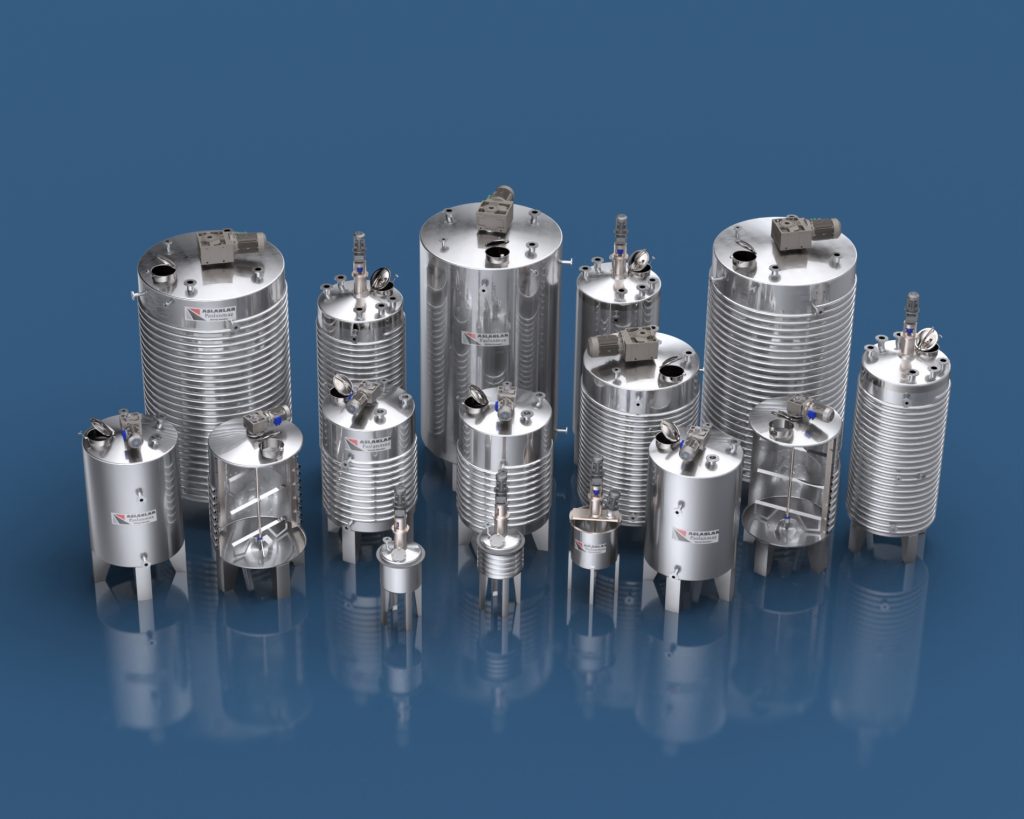High-Efficiency Production with Stainless Steel Reactors
Stainless steel reactors are one of the most critical pieces of equipment in industrial production processes. With their corrosion-resistant structures, hygienic surfaces, and technological features that increase energy efficiency, they provide high efficiency in the food, chemical, and pharmaceutical industries. In this article, the advantages, application areas, and contributions of stainless steel reactors to high-efficiency production are examined in detail.
What is a Stainless Steel Reactor?
Stainless steel reactors are durable tanks designed to carry out chemical reactions or process raw materials. These reactors, made from stainless steel, offer a long-lasting, hygienic, and corrosion-resistant solution.
Stainless Steel and Its Properties
Stainless steel is an alloy composed of a mixture of elements such as iron, carbon, chromium, and nickel. This material used in stainless steel reactors:
- Is resistant to corrosion: Withstands acidic or basic substances.
- Is hygienic: Prevents bacterial buildup, making it ideal for use in the food and pharmaceutical industries.
- Is durable: Strong against high pressure and temperature conditions.
Functions and Basic Structure of Reactors
Stainless steel reactors optimize chemical reactions with their heating, cooling, and mixing systems. Their basic features are:
- Pressure resistance: Can operate safely under high pressure.
- Heat transfer performance: Ensures that reactions occur at the ideal temperature.
- Modular design: Can be customized for different capacities.
Advantages of Stainless Steel and Its Role in Production
Stainless steel stands out in production with its durability and hygienic structure. These features of stainless steel reactors both increase quality and reduce costs in industrial processes.
Corrosion Resistance and Durability
Stainless steel is resistant to corrosion thanks to the oxide layer that forms on its surface. This ensures that the reactors have a long life even when working with aggressive substances such as acids, bases, or saltwater.
Aesthetic and Hygiene Advantages
The smooth surface of stainless steel facilitates cleaning and maintenance processes. This provides a great advantage, especially in areas where hygiene is critical, such as food and pharmaceutical production.
Ease of Use in Industrial Processes
With their durable structures, stainless steel reactors offer stable performance even under high temperature and pressure conditions. This allows chemical reactions to be carried out more safely and efficiently.
Types of Stainless Steel Reactors
Stainless steel reactors are designed in different types according to production needs. The types of reactors, classified by their functions, are as follows:
Pressure Reactors
Reactors that operate under high pressure are used extensively, especially in the chemical industry. These types of reactors ensure that hazardous reactions are carried out safely.
Heated/Cooled Reactors
Reactors equipped with heat transfer systems allow for rapid and controlled temperature changes. They are frequently preferred in the food processing and pharmaceutical sectors.
Mixing Reactors
These reactors ensure that homogeneous mixtures are obtained. They are particularly ideal for viscous liquids or solid-liquid mixtures.
Application Areas of Stainless Steel Reactors
Stainless steel reactors have a wide range of industrial applications. They are used in many fields, especially in the food, chemical, and pharmaceutical industries.
Food Processing
Stainless steel reactors offer a hygienic and efficient solution in processes such as dairy products, liquid oils, jam, and sugar processing. The smooth surface of the reactors prevents the accumulation of microorganisms.
Chemical Synthesis and Reactions
In the chemical industry, they ensure that complex reactions are carried out safely under high pressure and temperature. For example, they are commonly used in polymerization and catalysis processes.
Pharmaceutical Production
Stainless steel reactors used in the production of pharmaceutical products play a critical role in preserving the purity and efficacy of drugs.
What is High-Efficiency Production?
High-efficiency production is an approach to achieve maximum output with minimum cost by optimizing production processes. Stainless steel reactors play an important part in this process.
Energy and Raw Material Savings
Stainless steel reactors are equipped with heat transfer systems that minimize energy consumption. Additionally, they provide savings in production by reducing raw material losses.
Improvement Through Process Automation
Thanks to automation technologies, reactors can be continuously monitored and controlled. This reduces errors in production and increases quality.
Minimum Waste Principle
The high-precision design of stainless steel reactors optimizes raw material usage and minimizes waste generation.
How Stainless Steel Reactors Provide High Efficiency
Stainless steel reactors reduce production costs by saving energy and time in modern production processes.
Heat Transfer Performance
The advanced heat transfer mechanisms of the reactors shorten reaction times and reduce energy consumption.
Automation Systems
Reactors equipped with sensors increase production efficiency by monitoring processes in real-time. Smart software ensures optimal production conditions without the need for operator intervention.
Mixture Homogeneity
The mixing mechanisms ensure that raw materials are distributed evenly. This increases the consistency of product quality.
Stainless steel reactors are indispensable equipment for high-efficiency production. The advantages of hygiene, durability, and efficiency they provide in critical sectors such as food, chemistry, and pharmaceuticals make these devices a cornerstone of modern production processes.
Stainless steel reactors are generally made from 304 or 316 grade stainless steel. These types of steel are known for their corrosion resistance and durability.
No. The corrosion-resistant nature of stainless steel surfaces reduces the need for maintenance and ensures long-term use. Only periodic cleaning and inspection are sufficient.
Stainless steel reactors are used especially in the food, chemical, and pharmaceutical sectors. They are also preferred in fields such as biotechnology, cosmetics, and the petroleum industry.
Stainless steel reactors can be produced in various capacities, from a few liters to thousands of liters. The capacity is determined according to the intended use and sector needs.
Stainless steel reactors provide a cost advantage with their durability, corrosion resistance, easy-to-clean structure, and long service life.
Prices vary according to the reactor’s capacity, the type of steel used, design features, and requests for extra equipment. There may also be a price difference between domestic and imported products.


